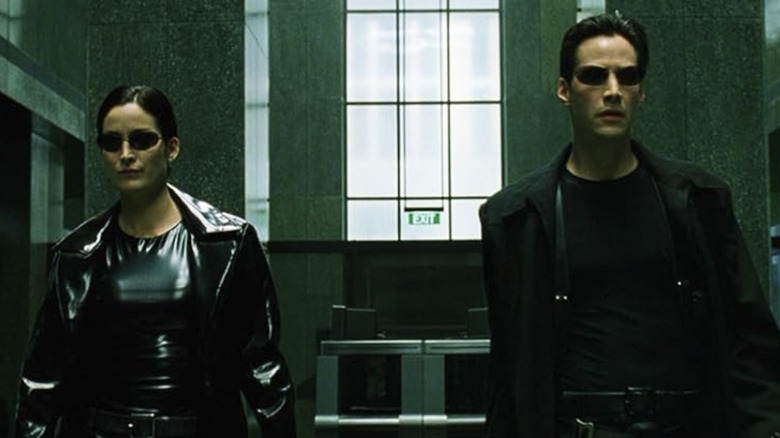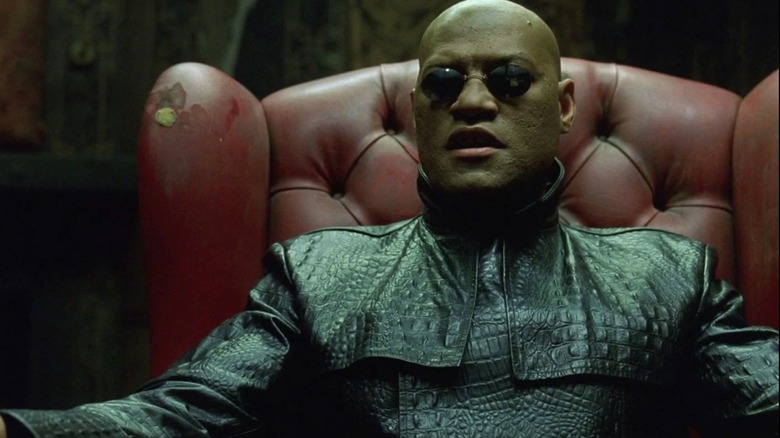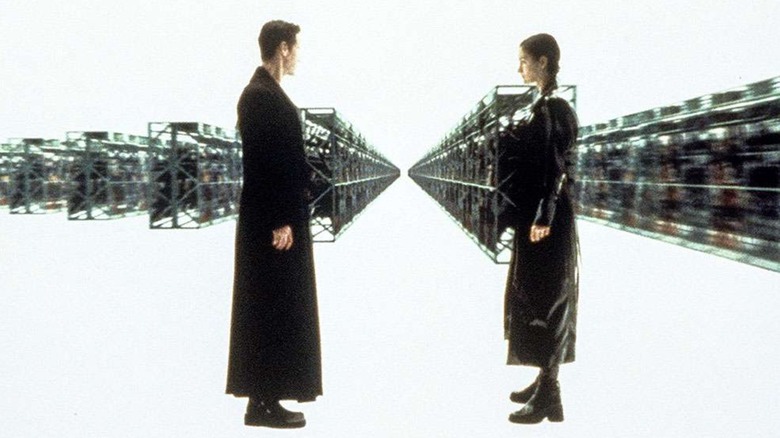What Sci-Fi Author William Gibson Thought About The Matrix
In 1984, sci-fi author William Gibson wrote the first entry in his critically acclaimed "Sprawl" trilogy. This novel, "Neuromancer," fleshed out key aspects of Gibson's earlier work, including an examination of what we understand as cyberspace, anti-authority themes in dystopian settings, and the corruption-laden ideologies of multinational conglomerates. In fact, "Neuromancer" both popularized and anticipated the core tenets associated with the cyberpunk genre, while critiquing the suffocating conservatism of the times. So when Gibson saw a groundbreaking sci-fi film helmed by the Wachowskis in 1999, he immediately noticed the thematic overlaps with "Neuromancer," which it draws heavily from. To no one's surprise, Gibson is truly fond of "The Matrix," and he has made it a point to praise its merits on more than one occasion.
In a now-archived blog post, Gibson stated that he was "prepared not to like 'The Matrix'," but was pleasantly surprised by its similarities with the works of sci-fi author Philip K. Dick (which is always a good thing):
"I liked it a lot. I even went back to see it a second time in theatrical release, which is unusual for me. I thought it was more like Dick's work than mine, though more coherent, saner, than I generally take Dick to have been. A Dickian universe with fewer moving parts [...] A Dickian universe with a solid bottom [...] It's thematically gnostic, something 'Neuromancer' isn't."
While talking about the influence of his own novel on the film, Gibson is frank about the fact that "Neuromancer" is also the culmination of works he was shaped by through "creative cultural osmosis." That said, the cyberpunk genre wasn't a fully-formed concept when Gibson penned the novel. That wasn't the case for the Wachowskis, who had a pre-existing aesthetic to draw from while coming up with their film's premise.
Gibson's love for The Matrix has been consistent over the years
The influence of "The Matrix" cannot be overstated. In Gibson's own words, "'The Matrix' is arguably the ultimate cyberpunk artifact," as it has accurately predicted our contentious (and complicated) relationship with technology through a cyberpunk lens. The film obviously draws from concepts that eclipse sci-fi, including the philosophical tenets of Plato's "Allegory of the Cave," which illustrates the gulf between reality and our distorted perception of it, but at its core, "The Matrix" is a cyberpunk marvel, where Neo (Keanu Reeves) is the anti-establishment figure whose mere existence is a glitch — an anomaly that is revealed to be intentional in the sequels.
Gibson has often taken to Twitter to express his fondness for the film. In 2019, he tweeted: "The Matrix has always felt to me like a kung-fu Phil Dick movie with an enthusiastically tacky cyberpunk wardrobe. Great combo!" While Gibson likes to make Philip K. Dick comparisons, he has downplayed the overt influence "Neuromancer" has had on "The Matrix" — but the film's conception might've been impossible without it.
You see, cyberpunk wouldn't be this clearly defined as a genre without Gibson's "Sprawl" books, which are foundational to the concept of cyberspace and the act of jacking into the virtual world. What's more, the narrative similarities between the two are rather blatant. In "Neuromancer," the protagonist, Case, is a computer hacker in a dystopian city (like Neo!), who is enlisted into a crew for a high-stakes heist and even aided by a powerful AI. Can you guess what the novel's virtual reality system is called? Yes, it's dubbed "the matrix," which Gibson describes as "a consensual hallucination...a graphic representation of data abstracted from the banks of every computer in the human system."
Gibson's Neuromancer deserves more attention for its genre-defining themes
Although "The Matrix" draws heavily from "Neuromancer," its merits as a film aren't confined to the premise alone, but everything else that informs the medium (including visual aesthetic, dialogue, and the inspired depiction of "bullet time"). While Gibson's "Neuromancer" isn't technically overlooked, it's still no mainstream phenomenon, despite the influential shadow it casts on everything from "Ghost in the Shell" to "Cyberpunk 2077." Take the opening lines of the novel, which immediately set the tone for a strange, futuristic journey, but feel oddly familiar in retrospect:
"The sky above the port was the colour of television, tuned to a dead channel. 'It's not like I'm using,' Case heard someone say, as he shouldered his way through the crowd around the door of the Chat [a bar]. 'It's like my body's developed this massive drug deficiency.' It was a Sprawl voice and a Sprawl joke."
The term "Sprawl" refers to the novel's Boston-Atlanta Metropolitan Axis area, a kind of cyberpunk slang used to refer to a hyperspecific cultural bubble. Substance abuse is immediately established as a theme, and it's something Case personally battles with as an underpaid, burnt-out hacker and "console jockey." Also, the sky mimicking television static immediately conjures the image of dystopian billboards that infringe upon nature — a "Blade Runner"-esque cityscape, if you will. Each one of these vivid concepts is a staple of cyberpunk media, but Gibson firmly establishes them in this memorable opening alone. As you read on, Case emerges as a cynical anti-hero who exists along the fringes and is suddenly chosen to prove his worth while contending with imminent death.
Hopefully, the upcoming "Neuromancer" Apple TV+ adaptation will reignite our collective love for Gibson's novel.


